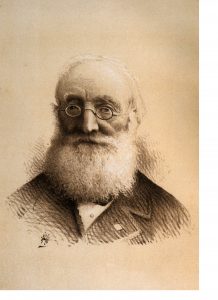Dr John Singleton
 Dr John Singleton was born January 1808 in Dublin, to William and Mary Singleton. Apprenticed to an apothecary and then a general medical practitioner, Dr Singleton attended medical school in Dublin and Glasgow and graduated as a doctor in 1838. Dr Singleton moved to Melbourne in 1851 with his wife, Isabella, and their 10 children. An evangelical Protestant and exponent for the virtue of temperance, Dr Singleton joined Melbourne societies that aligned with his beliefs. Dr Singleton was morally motivated to assist those less fortunate than himself, such as supplying medical aid for the poor and visiting gaols.
Dr John Singleton was born January 1808 in Dublin, to William and Mary Singleton. Apprenticed to an apothecary and then a general medical practitioner, Dr Singleton attended medical school in Dublin and Glasgow and graduated as a doctor in 1838. Dr Singleton moved to Melbourne in 1851 with his wife, Isabella, and their 10 children. An evangelical Protestant and exponent for the virtue of temperance, Dr Singleton joined Melbourne societies that aligned with his beliefs. Dr Singleton was morally motivated to assist those less fortunate than himself, such as supplying medical aid for the poor and visiting gaols.
Dr Singleton based his practice in Warrnambool, Victoria, from 1860-64, where his interest in the welfare of First Nations people led to his involvement in the founding of the Framlingham Aboriginal Reserve. After continuing his evangelical missions in Mount Gambier and Maryborough, Dr Singleton returned to Melbourne and established a free medical dispensary in Collingwood, designed to provide mothers with advice and medicine for their children.
Dr Singleton was concerned about the high rate of infant mortality in Melbourne and in 1870 partnered with Dr William John Smith to establish The Children’s Hospital in its first location at 39 Stephen Street, Melbourne. The Children’s Hospital was initially established as a charity for the treatment of children from poor families and Dr Singleton took on the role of Attending Physician.
As a physician, Dr Singleton was scholarly; he published numerous journal articles on a range of medical topics and was quick to adopt methods that were new to the profession. However, his religious beliefs – and propensity to let them pervade all he was involved in – brought him into disagreement with others on the committee in charge of The Children’s Hospital. In 1871 Dr Singleton resigned from the committee, stating ‘I could not feel that where God was not acknowledged I had any proper place or business.’
Dr Singleton instead focused his efforts through the Society for the Promotion of Morality, a group that established shelters for the unemployed or destitute – many of these shelters still exist in some form and have taken the Singleton name in his honour. He was also a strong advocate for women in the medical profession, being instrumental in the assignment of the first woman to practise medicine in Victoria. Dr Singleton died in 1891, shortly after the publication of his memoir, A Narrative of Incidents in the Eventful Life of a Physician.
